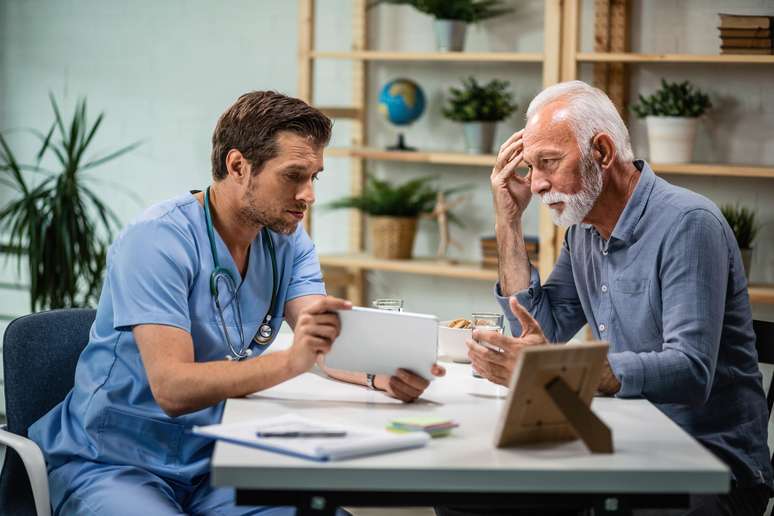November 17 is World Prostate Cancer Day, the second leading cause of cancer death among men in Brazil.
November 17 is World Prostate Cancer Day. The disease is the second leading cause of cancer death among men in Brazil, behind only non-melanoma skin cancer. According to data from the National Cancer Institute (INCA), the forecast is that there will be more than 70 thousand new cases every year.
Blue November is the global campaign that runs throughout the month of November to raise awareness of men’s health, with a main focus on the prevention and early diagnosis of prostate cancer. This initiative aims to encourage men to take care of their health on a regular basis. To understand more about the disease, the Earth you I talked about it with the urologist Fernando Marsicano.
What are the early signs and symptoms of prostate cancer?
According to the specialist, prostate cancer, in its initial stages, has no symptoms. In more advanced stages, however, signs begin to appear that include difficulty urinating, urinary bleeding, and pain when urinating.
In the case of metastatic disease, that is, when the cancer spreads to other parts of the body, the symptoms can be more intense, with pain in the lower back and pelvic area, erectile dysfunction, the presence of blood in the sperm and sudden weight loss.
The doctor points out that some of these manifestations can also occur in the case of benign prostatic hyperplasia, a condition characterized by non-cancerous growth of the prostate.
The urologist recommends seeking medical attention as soon as these symptoms begin to interfere with daily activities, because the earlier the diagnosis is made, the greater the chance of effective treatment.
What increases the chance of developing prostate cancer?
Age is one of the most significant risk factors, with a greater chance of developing cancer after age 50. Obesity is also associated with the risk of prostate cancer, especially in cases of severe obesity.
As for diet, studies are varied, but Marsicano points out that high consumption of alcohol, milk and red or processed meat may be related to a greater risk, while tomatoes, due to lycopene, and adequate levels of vitamin D can have a protective effect.
Genetics also plays an important role, with a higher incidence of cases among people of African descent and in men with a family history of the disease. Additionally, genetic variants, such as BRCA1 and BRCA2, have been identified in 15.6% of prostate cancer patients.
When is the right time to start routine tests?
The National Comprehensive Cancer Network (NCCN) recommends that men at average risk begin screening at age 45. Those in higher risk groups, such as people of African descent and those with a family history or genetic mutations associated with prostate cancer, should start at age 40.
“For an early diagnosis, an annual check-up by the urologist is recommended”, explains the doctor.
Treatments available
The main treatment options for prostate cancer include surgery, radiation therapy, hormone therapy and active surveillance, with the choice based on the stage of the cancer and the patient’s general health status.
Surgery to remove the prostate is mainly indicated in cases of localized cancer and low surgical risk. Radiotherapy is indicated for men who cannot undergo surgery and can cause effects such as incontinence and erectile dysfunction.
For patients with advanced cancer, hormone therapy, which limits testosterone levels in the body, may be an effective alternative. In less aggressive cases and in older men, active surveillance allows for careful monitoring without invasive interventions, with regular tests to monitor tumor progression.
Lifestyles and prevention
Although there is no exact formula for prevention, the urologist indicates some measures that can help reduce the risk of the disease, such as maintaining a balanced diet, rich in antioxidants, eating tomatoes and reducing red meat and processed foods.
Additionally, regular physical activity, weight control, moderation in alcohol consumption, and abstinence from smoking are recommended practices for overall health and may benefit prostate health.
Source: Terra
Ben Stock is a lifestyle journalist and author at Gossipify. He writes about topics such as health, wellness, travel, food and home decor. He provides practical advice and inspiration to improve well-being, keeps readers up to date with latest lifestyle news and trends, known for his engaging writing style, in-depth analysis and unique perspectives.







-rkzmjat24gmq.png)
